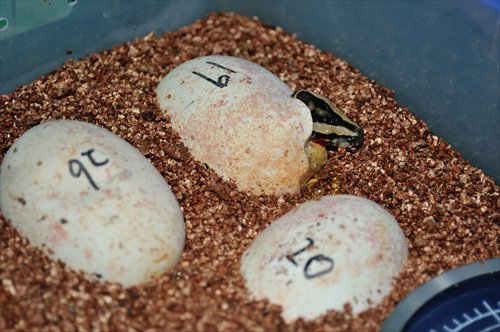

A baby python hatches from an egg. Photo: Courtesy of the Shanghai Zoo
Newborn babies have a special place in the hearts of people and the Shanghai Zoo has seen 131 special babies born in the first half of the year - some of these babies of 37 different species are rare and have had to be nursed gently into the world.
This requires special attention, dedication and skill as experienced keepers break nature's rules and become the temporary mothers for some attractive and sometimes some rather unappealing babies.
In the zebra compound at the zoo, the keeper in charge of looking after the now 2-month-old cute zebra foal, Chocolate, is Zhu Jianqing. Chocolate was born on May 26 but because its mother could not feed it the keepers took the foal away from its mom after a few days and began feeding it themselves.
This was the first time anyone at the Shanghai Zoo had attempted to hand-rear a zebra foal and the responsibility for taking care of this skittish baby fell to 28-year-old Zhu.
"I am not a father yet and have never nursed a baby but I have been bottle feeding the baby zebra almost every day since he was born," Zhu said. He graduated from the Shanghai Normal University with a degree in zoology and has been looking after zebras and hartebeests for some time.
Supplements needed
Every morning before 7, Zhu comes to the zebra compound to prepare breakfast for Chocolate. He warms some milk in a microwave oven and adds mineral and vitamin supplements - "here is not enough nutrition in the milk itself."
"These bottles contain 250 milliliters and Chocolate needs to have 500 milliliters of milk at each feed so we prepare two bottles every time. Daily he needs to have 2 liters of milk so we feed him at 7 am, 11 am, 4 pm and 10 pm every day," Zhu said.
When Chocolate was born he weighed just 38 kilograms but since then he has gained another 10 kilograms and now his head can touch Zhou's chest. He will be putting on weight for some time now - adult zebras weigh 300 to 400 kilograms.
Zhu said in a couple of months Chocolate will be weaned and will return to the compound to live with his mother and the other zebras. For the present though the closest animal the little creature knows is Zhu Jianqing.
"Whenever it sees me it prances toward me and wants to follow me wherever I go," Zhu said stroking the zebra foal's mane while it nuzzled his arm.
"It's very bright and can understand some different commands now. When we have to check its weight and take its temperature it knows what has to be done and let's us do this." Zhu said he often now feels like a proud father.
Most of the keepers at the Shanghai Zoo are assigned to specific animals and are not given a choice. So when 35-year-old Han Sigang found himself working with reptiles it was not the job he would have preferred initially.
"Like most people I was scared of snakes but now I think they are beautiful. These Burmese pythons are some of the gentlest animals in the world. They have slow metabolisms. They crawl onto tree branches and stay there for long periods without moving."
No fear
"Anyway, I have raised some of these since they were babies so I do have a lot of feeling for them," Han said. His 8-year-old daughter has also accepted his babies and shows no fear of snakes.
Burmese pythons are one of the largest snake species in the world and are found in Southern and Southeast Asia. They have been kept in the Shanghai Zoo for 20 years. But because of the different temperatures and humidity levels in Shanghai the zoo struggled until 2010 to breed pythons here successfully.
In June 2010, the zoo welcomed its first three homegrown baby pythons and earlier this year those pythons laid eggs which were incubated and cared for by the keepers. The breeding program is a pronounced success with some 60 baby pythons now thriving in the enclosure.
Han said Burmese pythons were incubated for between 64 and 72 days and the keepers have now pretty well mastered the techniques to breed and rear the creatures. After years of experimenting with temperature and humidity controls the Shanghai Zoo incubation success rate stands at 81 percent.
Unlike mammals, as soon as these baby pythons have hatched they need to be fed live prey - usually baby mice or pigeon chicks. "This simulates life in the wild," Han said.
At present there are 12 adult Burmese pythons and 60 babies at the zoo. When the babies hatch they are just 60 centimeters long but after two years they will have grown to 3 meters or so and can start breeding.
Copyright ©1999-2018
Chinanews.com. All rights reserved.
Reproduction in whole or in part without permission is prohibited.